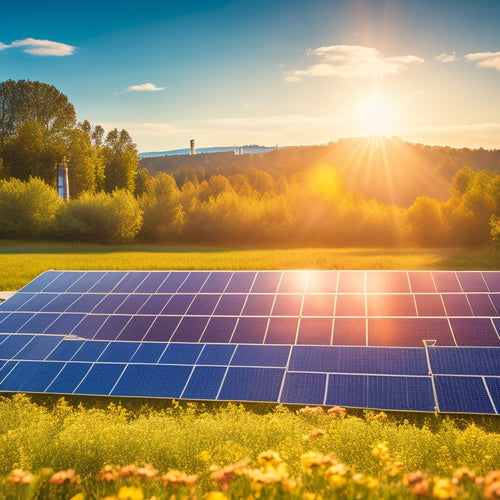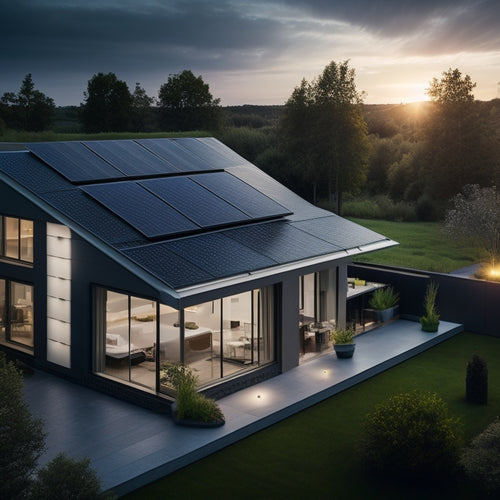
Solar System for Home With Battery
Share
You're investing in a solar system for your home with a battery to utilize renewable energy, reduce your reliance on the grid, and enjoy the benefits of energy independence and a lower carbon footprint. By integrating a battery into your solar system, you'll store excess energy generated during the day for use at night or during outages, enhancing energy independence and reliability. You'll want to assess your daily energy usage patterns to size your solar system correctly and guarantee you have a suitable inverter that can handle power surges. Now, uncover how to optimize your system's performance and unleash its full potential.
The Essentials
- Solar systems with batteries provide energy independence, reducing reliance on the grid and enabling off-grid living potential.
- Battery integration stores excess energy generated during the day for use at night or during outages, enhancing energy reliability.
- Lithium-Ion batteries are a popular choice for home energy storage due to their higher energy density and longer lifetimes.
- Energy management systems optimize energy usage patterns, maximizing system performance and efficiency.
- Backup power duration depends on system design and battery maintenance practices, with high-efficiency inverters and smart battery management systems enhancing efficiency.
Renewable Energy for Homes
You're considering renewable energy for your home, and solar power is a prime option.
You'll want to understand the benefits of solar power, including reduced energy bills and a lower carbon footprint.
By integrating a residential energy storage system with your solar panels, you can store excess energy and optimize your energy consumption, reducing your reliance on the grid.
To guarantee a steady supply of energy, you'll also need to investigate energy storage options, such as batteries, to store excess energy generated by your solar panels.
Solar Power Benefits
Utilizing solar power for your home opens up a multitude of benefits, primarily stemming from its renewable energy nature. You'll reduce your reliance on the grid, enjoying greater energy independence and freedom from rising electricity costs.
Solar power also provides a notable reduction in your carbon footprint, contributing to a cleaner environment for future generations. By investing in an all-encompassing solar power system for your house, you can eliminate the worry of rising electricity bills and solve the problem of sky-high energy costs that strain your budget every month.
Additionally, solar power systems address the environmental impact of traditional energy sources, reducing your carbon footprint and contributing to a cleaner, more sustainable future.
Alongside these benefits, you'll also reap financial rewards. Solar incentives, such as tax credits and rebates, can greatly offset the initial investment in your solar system.
Moreover, you'll experience considerable energy savings over time, as solar power generates electricity at a lower cost than traditional energy sources. This translates to lower utility bills, freeing up more of your hard-earned money for other important expenses.
With solar power, you'll enjoy long-term savings, increased property value, and a reduced carbon footprint – all while doing your part to create a more sustainable future.
Energy Storage Options
Pairing your solar power system with energy storage options is an important step in maximizing the benefits of renewable energy for your home. By incorporating a battery into your system, you can store excess energy generated during the day for use during the night or when the grid goes down. This allows you to maintain power independence and reduce your reliance on the grid.
With a Home Solar Battery, you can say goodbye to concerns about unexpected power outages and high energy bills, and instead enjoy a more sustainable, resilient, and cost-effective energy solution Residential Solar Battery.
When selecting an energy storage solution, you'll need to evaluate the type of battery that best suits your needs. Lead-acid batteries are a cost-effective option, but they've a shorter lifespan and lower depth of discharge compared to lithium-ion batteries. Lithium-ion batteries, on the other hand, offer higher energy density and longer lifetimes, making them a popular choice for home energy storage.
Effective energy management is also vital to getting the most out of your energy storage system. This involves monitoring your energy usage patterns and optimizing your system's performance to guarantee that you're storing and using energy efficiently.
Low Carbon Footprint Guarantee
You'll be pleased to know that your solar system for home is designed to greatly reduce carbon emissions, which contribute to climate change.
By utilizing renewable energy, you'll minimize your reliance on fossil fuels and lower your carbon footprint.
With energy independence matters, you'll be taking an essential step towards a more sustainable future, where you're in control of your energy needs.
Additionally, installing a solar system with a battery can help you achieve energy efficiency and reduce your energy bills.
This not only benefits the environment but also saves you money in the long run.
Carbon Emissions Reduction
Your home's carbon footprint is a considerable contributor to the overall environmental impact of your solar system. By reducing carbon emissions, you're not only doing your part for the environment, but you're also increasing your energy independence.
With a solar system for your home, you can considerably decrease your reliance on fossil fuels, which are a major source of greenhouse gas emissions.
By adopting sustainable practices, such as carbon capture and storage, you can further minimize your home's carbon footprint. Carbon capture technology absorbs carbon dioxide emissions from power plants and industrial processes, preventing them from entering the atmosphere.
This technology, combined with your solar system, can considerably reduce your home's carbon emissions.
You'll be doing your part to combat climate change while also enjoying the benefits of renewable energy. With a low carbon footprint guarantee, you can rest assured that your solar system isn't only environmentally friendly but also a sound investment for your future.
Energy Independence Matters
By investing in a solar system for your home, you're taking a significant step towards energy independence, which is critical in today's environmentally conscious world. This means you'll be less reliant on the grid and have more control over your energy usage. With a solar system, you'll be able to generate your own clean energy and reduce your reliance on fossil fuels.
| Benefits of Energy Independence | Description |
|---|---|
| Off Grid Living | Live independently from the grid and have control over your energy usage |
| Sustainable Lifestyle | Reduce your carbon footprint and contribute to a cleaner environment |
| Energy Security | Protect yourself from rising energy costs and grid outages |
Inverter Handles 5000W Surge
You need an inverter that can handle power surges to guarantee your solar system operates safely and efficiently.
With residential energy storage solutions, it's crucial to evaluate the inverter's surge capacity to avoid system overload.
The inverter's surge capacity is critical, as it determines how well it can handle sudden spikes in power demand, such as when multiple appliances turn on simultaneously.
With a 5000W surge capacity, your inverter can absorb and manage high power peaks, protecting your system from damage.
Power Surge Protection
Reliability is paramount when it comes to utilizing solar energy for your home. You need a system that can withstand power surges and voltage fluctuations to guarantee continuous operation. That's why power surge protection is a critical component of your solar system.
When you're generating your own clean energy, the last thing you want is for a power surge to damage your equipment or disrupt your supply. Your inverter is designed to handle a 5000W surge, giving you peace of mind that your system can absorb unexpected spikes in voltage. This surge protection capability guarantees that your inverter and battery remain safe and functional, even during extreme weather conditions or grid instability.
Additionally, your solar system's voltage regulation feature guarantees that the electrical output is stable and within a safe range. This prevents damage to your appliances and electrical devices, while also protecting your system from backfeed electricity.
With strong power surge protection and voltage regulation, you can enjoy reliable, clean energy and the freedom that comes with generating your own power.
Surge Capacity Explained
Power surge protection is only as good as its surge capacity, which is why it's crucial to understand what this capacity entails. In your solar system for home with a battery, the inverter's surge capacity is critical in handling unexpected power spikes.
The inverter's ability to handle a 5000W surge means it can absorb and manage excess energy without compromising your system's performance or safety.
You need to take into account surge capacity when selecting an inverter for your energy management system. A higher surge capacity inverter can handle more significant power surges, safeguarding your appliances and electronics from damage.
This is particularly important for homes with refrigerators, air conditioners, or other high-power appliances that require a sudden burst of energy to start.
When evaluating surge capacity, look for inverters that can handle at least 2-3 times the maximum power rating of your appliances. This guarantees your system can handle unexpected power surges without compromising performance or safety.
Assess Your Energy Demands
You need to understand your daily energy usage patterns to determine the right size of your solar system. This involves tracking your energy consumption at different times of the day to identify peak usage periods.
To achieve this, you can install photovoltaic panels that convert sunlight into electricity, and consider pairing them with energy storage units to store excess energy for later use.
You'll also need to calculate your total power requirements, including the wattage of all appliances and devices you plan to power with your solar system.
Daily Energy Usage Patterns
Energy consumption patterns vary considerably from one household to another, influenced by factors such as lifestyle, occupation, and climate. Your energy usage is unique, and understanding it's essential in designing an efficient solar system for your home.
Conducting an energy consumption analysis helps identify your daily energy usage patterns, including peak usage times.
You'll want to examine your energy usage during different times of the day, such as morning, afternoon, and evening. Are you using energy-intensive appliances like refrigerators, air conditioners, or washing machines during peak hours?
Do you have a home office that consumes energy throughout the day? Identifying these patterns will help you determine when you need the most energy and how to optimize your solar system to meet those demands.
Total Power Requirements Needed
Your unique energy usage patterns serve as the foundation for calculating your total power requirements. To get an accurate energy calculation, you'll need to assess your energy demands. This involves identifying the total power required to support your daily energy usage patterns.
Start by listing all the appliances, devices, and systems you want to power with your solar system, including lighting, refrigeration, HVAC, and entertainment systems. Note the wattage rating of each item and the number of hours you use them daily.
Next, calculate the total power estimation by multiplying the wattage rating of each item by the number of hours used. Add up the total watt-hours (Wh) required per day. This will give you your total daily energy requirement.
Consider your energy-intensive appliances, such as pool pumps or electric water heaters, which may require additional power. Be certain to account for any future energy needs, like adding an electric vehicle charger.
Accurate power estimation guarantees your solar system is properly sized to meet your energy demands, providing you with the freedom to live off the grid.
Longer Backup Power Duration
You'll want to guarantee your solar system provides extended power backup time to keep your essential appliances running during prolonged grid outages.
This is especially vital if you rely on medical equipment or have refrigeration needs.
Extended Power Backup Time
When the grid goes down, having an extended power backup time can be a lifesaver. With a solar system for your home, you'll have the freedom to keep your essential appliances running even when the utility grid is out.
But how long will your backup power last? The answer depends on your system's design and your battery maintenance habits.
A well-maintained battery is vital for extended power backup time. You'll want to ascertain your battery is properly sized for your energy needs and that it's operating within the recommended depth of discharge (DOD).
Regularly checking your battery's state of charge and performing routine maintenance tasks will also help maximize its lifespan.
To optimize your backup efficiency, consider a system with a high-efficiency inverter and a smart battery management system.
These features will help minimize energy losses and guarantee your battery is charging and discharging efficiently.
With the right system design and proper maintenance, you can enjoy extended power backup times and the peace of mind that comes with having a reliable source of energy.
Frequently Asked Questions
Can I Install the System Myself to Save Money on Labor Costs?
You can attempt a DIY installation to save on labor costs, but consider your technical knowledge and time commitment; weigh potential cost savings against the risk of improper installation, voided warranties, and compromised system performance.
How Long Does It Take to Fully Charge the Solar Battery?
As you capture the sun's fiery power, you wonder how long it takes to fully charge your battery. The answer depends on charging factors like panel size and efficiency, as well as battery capacity, which can range from 5-15 hours to reach 100% capacity.
Are There Any Maintenance Requirements for the Solar Panels?
You'll need to perform regular panel cleaning to guarantee ideal energy absorption, and engage in system monitoring to detect potential issues, thereby assuring your system's efficiency and freeing you from concerns about its performance.
Can I Expand My Solar System in the Future if Needed?
As you gaze towards a brighter future, you'll appreciate the flexibility to scale up your system - seamlessly integrating future upgrades, effortlessly amplifying your power output, and securing the freedom to evolve with your energy needs.
Are There Any Government Incentives for Installing a Solar System?
You'll be pleased to know that yes, there are government incentives for going solar! You can claim a federal tax credit of up to 26% of your solar system's cost, and don't forget to investigate local rebates that can further reduce your expenses.
Final Thoughts
Your solar system for home with battery is now a lighthouse of sustainability, illuminating your path to a greener tomorrow. With a reliable inverter handling 5000W surges, you're shielded from power outages. Your carefully assessed energy demands are met with a longer backup power duration, ensuring your home remains a haven of comfort and convenience. As you utilize the sun's energy, you're not just powering your home - you're forging the way for a low-carbon lifestyle that's as bright as the future ahead.
Related Posts
-

Advantages of Solar Generating Systems Over Traditional Energy
Solar generating systems provide several key advantages over traditional energy sources. You'll experience lower long...
-

Smart Grid Technology Implementation Challenges
You'll encounter several challenges when implementing smart grid technology, particularly in cost management, scalabi...
-

Home Solar Battery
You're opting for a home solar battery that allows you to utilize the power of the sun during the day and use it at n...


